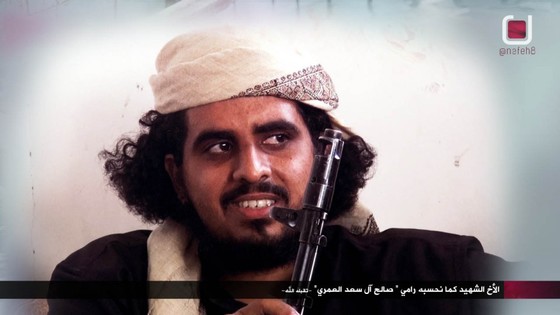Saleh al Sa’ad al Omari. (Source: Twitter)
On Oct. 6, a Twitter account affiliated with al Qaeda in the Arabian Peninsula (AQAP) began posting a series of tweets about the life of one of its slain fighters named Saleh bin Sa’ad al Sa’ad al Omari. Al Omari is believed to have been killed during the course of an AQAP attack targeting the Wadia border crossing into Saudi Arabia on July 4. AQAP named that attack, which also spilled into the Saudi town of Sharurah, the “invasion of revenge for the female captives,” and claimed that it was an act of retribution for the Saudi policy of detaining Muslim women.
Al Omari, given the nom-de-guerre Abu Othman, was born and raised in Najran, Saudi Arabia to a conservative household. When he was a young boy, Al Omari’s older brother, Sultan, was jailed in a Saudi prison on terrorism related charges. Because of this, al Omari regularly frequented Saudi prisons in his youth and saw “the oppression, aggression, and tyranny with his own eyes during his visits to his brother.” This formative experience made the condition of detainees in Saudi jails al Omari’s primary concern in these early years of his life.
AQAP’s eulogy of al Omari states that due to his “support for the detainees,” he was himself jailed by the Saudi authorities shortly before reaching the age of 19 “without any charges against him.” After his family placed pressure on the Saudi Interior Ministry, “the tyrants were forced to release Saleh [al Omari].” Al Omari apparently confessed to his investigators that he had intended to travel to Iraq, and this confession was “used as an excuse” for his nearly five-year long detainment.
During his time in prison, al Omari spent his time memorizing the Qur’an, studying, and “in service of his brothers.” Despite the fact that his brother was detained in the same prison, al Omari did not see or speak to him during his imprisonment. The AQAP eulogy of al Omari relays an anecdote of him helping a 60 year old prisoner whom he treated like his own father. According to the eulogy, the old man was allegedly so grateful to al Omari that he offered him his daughter’s hand in marriage, but al Omari modestly refused.
When al Omari was finally released from prison in 2011, he reportedly married and then “answered the call” of jihad and joined the mujahideen in Yemen in order “to support the religion and the weak.” In Yemen, al Omari was outspoken in his support for all detainees in general and for female detainees in particular. In this respect, “Allah almighty blessed him to be one of the six lions that carried out the invasion of revenge for the female captives.” The AQAP eulogy notes that “many mujahideen request to participate in these types of invasions; especially those in the Land of the Two Holy Places [Saudi Arabia], and they ask Allah to grant them martyrdom on its soil.”
The AQAP eulogy also indicated that al Omari was particularly incensed by Saudi Arabia’s imprisonment of Hayla Quseir, as well as the “kidnapping” of May al Talaq and Amina al Rashed, among others. Hayla Quseir, also known as Umm al Ribab, was has been described as “the most dangerous woman in al Qaeda.” She is said to have been involved in recruiting Saudi women to al Qaeda as well as financing the terrorist group and laundering money on its behalf. She was apparently so significant to the organization that upon her arrest by Saudi authorities in 2010, al Qaeda in the Arabian Peninusla’s deputy emir, Sa’id al Shihri, promised to take revenge on the Saudi regime for her detention.
The AQAP eulogy of al Omari ends with a description of his final battle and death as part of the AQAP attack on the Wadia border crossing. “He dashed like a lion…for the sanctity of Allah and pounced on the border guards of the tyrants of Yemen and the Land of the Two Holy Places [Saudi Arabia].” Al Omari was part of the group of AQAP fighters who crossed the border and clashed with Saudi authorities in the border town of Sharurah where he was ultimately killed.
Are you a dedicated reader of FDD's Long War Journal? Has our research benefitted you or your team over the years? Support our independent reporting and analysis today by considering a one-time or monthly donation. Thanks for reading! You can make a tax-deductible donation here.








